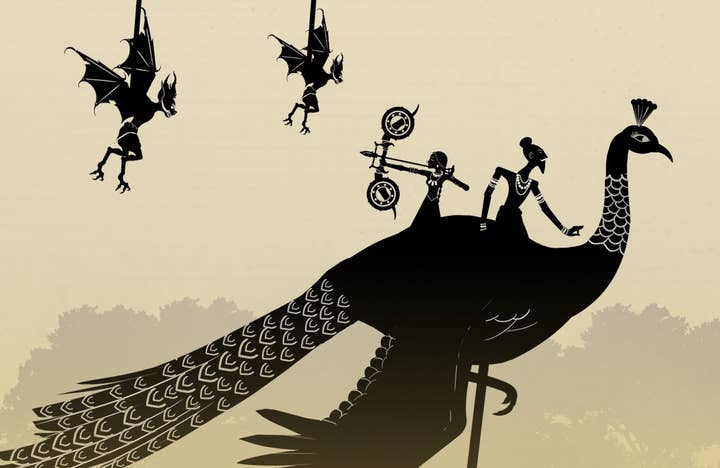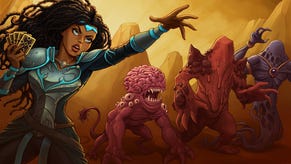India needs an industry where games like Raji can thrive
Following Narendra Modi's call for games based on Indian folklore, Nodding Heads Games recalls struggling in a system that doesn't understand game development
Last month, something remarkable happened to India's growing games industry: the country's prime minister, Narendra Modi, positioned it as vital to the country's future prosperity, and called for more video games based on "Indian culture and folk tales."
In one sense, it was remarkable that Modi mentioned video games at all, given the view of the medium by many in Indian society. More generally, though, it was a signal to the country's largely unheralded communities of developers that their fortunes might be about to change.
For Nodding Heads Games, an indie studio based in the city of Pune, it was stranger still. At almost exactly the same time, it launched its debut game, Raji: An Ancient Epic, an aesthetically ravishing action-adventure game that draws upon Balinese and -- yes -- Indian mythology and folklore.
"There is a lot of enthusiasm after what the prime minister said," says Avichal Singh, who co-founded Nodding Heads Games with Shruti Ghosh and Ian Maude. "It's good to see him support us, because the notion of video games being a waste of time, or being useless, is rampant throughout the country. It's just how the culture is -- a lot of people don't know about video games, so they think it's just animation. We have to work on that."
"The notion of video games being a waste of time, or being useless, is rampant throughout the country"
Avichal Singh
What the Indian games industry needs, however, is more than just words. For all that the launch of Raji can be seen as a success story, it is one pulled back from the brink of failure and collapse on numerous occasions. If this is the kind of game that Modi wants to see, it emerged from a structure that, to Nodding Heads' co-founders, seemed designed to prevent it from existing.
"It's a system, right?" Singh adds. "The whole economy, starting from design colleges, to supporting startups, infrastructure, tax relief. These are all things that, if the government pursues them, would be great for indie developers, so they don't go through what we went through."
The seed for Raji was planted at one of those design colleges, where Ghosh and Maude were both lecturers and Avichal was about to graduate. The three bonded over a shared taste for stylish action-adventure video games -- specifically the work of Supergiant Games -- and the nagging sense that the country's cultural heritage was a rich seam of inspiration that had been largely untouched by the industry.
"We always had in the back of our minds that we wanted to do a game that represented India," Ghosh says, recalling the early discussions about what form a collaboration might take. The group ultimately dispersed, with Ghosh and Singh taking jobs at EA Hyderabad and Zynga Bangalore respectively, and Maude staying on as a teacher in Pune. The idea for their game, however, was not diminished by the distance between them.
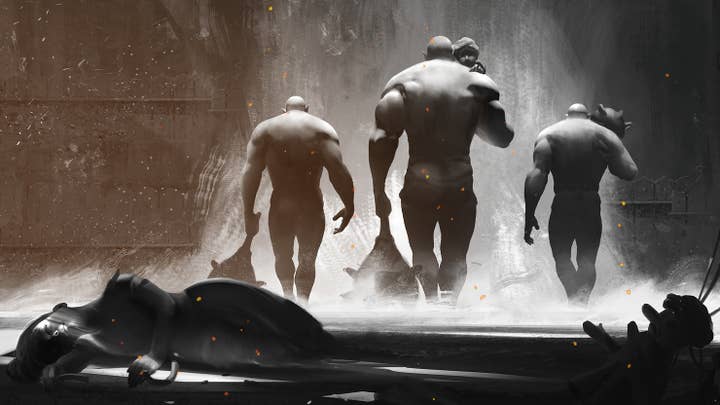
"It really started in 2016, around June, when we had a high-level concept," Singh says. "We knew it was going to be isometric-ish, because some of our inspirations were Bastion and Transistor, and that also keeps scope in check -- that was something we wanted to address in the early phase of the project.
"But to take such a big leap of faith, first of all you need some kind of proof that what you're going to do is gonna ring a bell to everyone around the world. Is it going to sell? You have to ask yourself that at the very first step?"
That impetus to jump was provided by Ghosh, who laid out a template for the game's viewpoint, visual style, and embrace of Indian and Balinese culture in a series of 2D drawings. Upon showing them to a group of developer friends, the decision to commit to making Raji went from a "leap of faith" to a creative imperative.
"They had a 'wow', jaw-dropping reaction," Singh recalls. "We asked, if this was a video game, would you buy it? They all said yes."
"Most investors that we spoke to wanted us to finish in six months, to do it episodic... It was a struggle to even talk to some of them"
Shruti Ghosh
Nodding Heads' ambitions for Raji were out of step with the prevailing trends in the Indian games industry. GamesIndustry has been a frequent visitor to developer conferences in the country, and each time there was an evident belief that attracting an international audience demanded a product that did not feel specifically Indian. Developers seldom aspired to capture some aspect of their cultural identity in their work.
"We never saw people taking that influence, but I think there are two big reasons," Singh says. "One is the [dominance of] the mobile market, which is a safer bet for many [indie studios in India]. The second is that game development is still very young in the country. There's only one other [developer]... Ogre Head Studio, which made [action rogue-like] Asura. That is the only studio even loosely inspired by Indian mythology."
This tendency to lean toward a mass market, homogenous aesthetic is no accident. Nodding Heads Games conducted a competitor analysis in the planning stages for Raji, and found what confidently believes was an international audience of PC and console players who would be interested in an action-adventure game that strayed from the usual Greek and Norse mythic inspirations. However, India's investment community is noted for its lack of understanding of the breadth of the video games market. As a premium title with no plans to launch on mobile, Nodding Heads struggled to find anyone in the country who understood its vision.
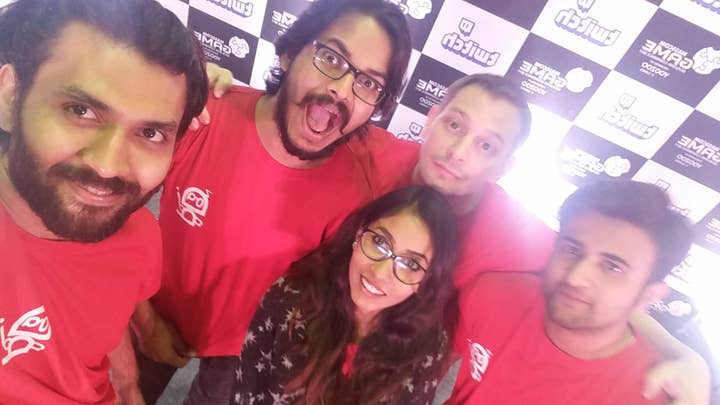
"Investors and VCs are interested in the mobile industry, because that's growing exponentially here," Singh says. "India doesn't have a strong background when it comes to PC and console games, and that is something we were trying to change, but who's going to take that risk on an untested team and their first product? That's where many roads ended."
Ghosh adds: "Investors [in India] don't understand how a PC or console game is made, how much time and effort goes into it. What they look for is a quick turnover for their investment. Most investors that we spoke to at that time, they always wanted us to finish in six months, to do it episodic. They didn't understand what we wanted to do with the game... It was a struggle to even talk to some of them."
"We had bills to pay, and the money was ending. We were literally down to the last rupee"
Shruti Ghosh
Nodding Heads was face-to-face with the reality of being a creative PC and console developer in a country with no publishers that work with that kind of product. Looking at the finished game, it's clear that Raji would be appealing to the myriad indie labels in Europe and North America, but the country's developers are also at a disadvantage when trying to meet with such companies; they don't often visit India in the search for games, and the shows they do attend are prohibitively expensive for a team with limited resources.
At the end of 2017, Nodding Heads attempted to raise money with a Kickstarter campaign. When that failed to reach its target in time, Ghosh sold her apartment to fund Raji's development for a little longer. Even with that tremendous personal sacrifice, the future of the project remained unclear.
"There was a point where me, Avichal and Ian had a conversation that was, to me, the most difficult conversation we've had," Ghosh recalls. "We set a date, and if we didn't finalise [a deal] by that date... we [agreed to] let the team know to go and find jobs -- and look for jobs ourselves.
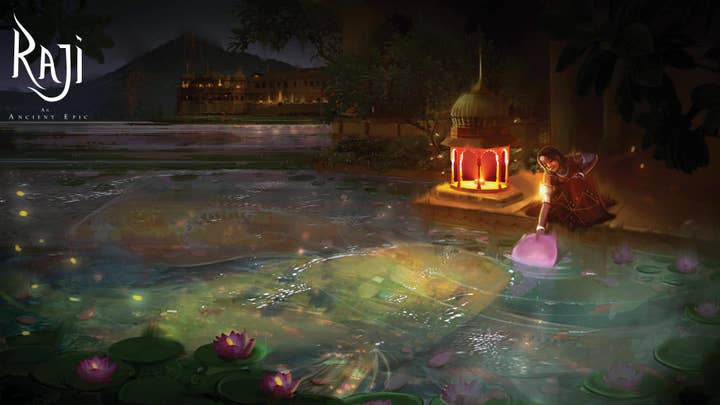
"We had bills to pay, and the money was ending. We were literally down to the last rupee. We were constantly feeling the pressure that this thing would never see the light of day... There were points where we thought it would just not pan out."
The efforts of Singh, Ghosh and Maude aside, if there is one factor responsible for Raji existing today, it is probably the assistance of Epic Games. As an Unreal Engine 4 developer, Nodding Heads was eligible for an Unreal Dev Grant -- a programme that gives between $5,000 and $50,000 in funding to select projects made with the engine. When Raji was chosen for the initiative in June 2018, it was enough to extend the deadline for a deal just a little further. To use Ghosh's phrase: "It was the last lifeline."
But Epic's help didn't end there. The Fortnite publisher enquired about Nodding Heads plans to attend the Develop:Brighton in the UK, England the following month. However, with just the grant money to keep the project going, there was no way to justify the expense, regardless of how much opportunity it might bring.
"We've gone through torturous times with Raji's development, because we wanted to make the best game possible within the timeframe"
Ian Maude
"We said we just can't afford it," Maude recalls. "And they said 'We'll fund X, Y, Z, get the tickets booked, come on over.' That was just amazing. You don't get that often in the industry."
That summer in 2018, Nodding Heads flew to the UK with Epic's assistance, attended Develop:Brighton, and visited the EGX consumer expo -- a relatively common plan among indies in Western and Northern Europe, but one beyond the reach of the vast majority of Indian studios. In October of that year, it signed a publishing deal with Super.com. The team expanded from seven people to 13 as a result, and for the first time since work started more than two years earlier, Nodding Heads was able to focus entirely on development.
"Credit to Super, to be honest, because they allowed us to make the game we always wanted to make," Maude says. "We've gone through torturous times with Raji's development, because we wanted to make the best game possible within the timeframe."
When Raji: An Ancient Epic did launch, it did so as a timed exclusive for the Switch, as part of a Nintendo Direct indie showcase on August 18. It is the kind of platform that indie developers dream about, and that level of exposure is virtually unheard of among small teams in India. According to Singh, when the moment arrived, he, Ghosh and Maude were overcome with emotion.
"Because of the amount of struggle that has gone into this, and the amount of stress we had to deliver it, the launch was really, really wonderful," he says. "Our social media blew up... The first 48 hours was just like 'give up.' You can't keep up with the messages, all from people responding extremely positively.
"There have been games that have one level that [draws from] India... but there hasn't been a full-fledged game like ours -- which is made in India, made by a team the majority of which is Indian.
"It speaks of authenticity. It speaks of passion. It speaks of cultural representation."
